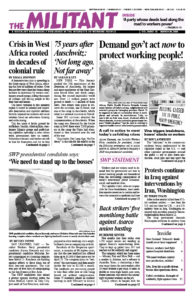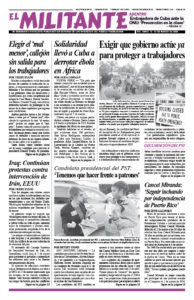AUCKLAND, New Zealand — “This should never have happened,” Hilton Rohe, a retired meatpacking worker, told the Militant Feb. 20 in a phone interview. He was talking about the death of fellow union fighter Alfred Edwards, known as Baldy, who was fatally struck by falling boxes of meat in a freezer at the AFFCO meatworks in Wairoa two weeks earlier.
On hearing news of the death, Rohe said, “I put my ‘Union Hard’ T-shirt on” and joined other union supporters to stand “outside the freezer where Baldy died. I confronted the production manager and said, ‘All for the sake of money.’”
The Feb. 28 Militant Labor Forum — “Unions, Workers and the Fight for Safety: No Worker Should Die on the Job!” — took up Edwards’ death and how workers face constant pressure from the bosses to cut corners to meet deadlines or production targets.
“Only by organizing a fighting workers’ movement and using union power can we prevent the bosses from poisoning the air, water and soil around us, and protect the lives and limbs of workers on the job,” forum speaker Mike Tucker of the Communist League said.
The funeral notice posted by Edwards’ family ended with the salute, “Union hard forever.” He was one of the hundreds of Meat Workers Union members who had resisted when AFFCO bosses moved to drive the union out of its eight plants on the North Island.
In response to AFFCO’s locking union members out in 2012 and again in 2015-16, workers in Wairoa — a town of around 5,000 people — set up pickets on the main road. They finally won a new union contract in 2017.
Edwards and his wife Teena, also a worker and union fighter at the plant, were among a group of workers who had met and joined a discussion with Socialist Workers Party vice presidential candidate Osborne Hart when he visited Wairoa in 2016 during a speaking tour in New Zealand.
‘Fight so this doesn’t happen again’
Interviewed on Radio New Zealand’s “First Up” show nine days after Edwards’ death, his son Moana said that he was told that a container of meat “fell on him and squashed him.” His disappearance went unnoticed for more than five hours, in spite of a company rule that freezer hands work in pairs.
“The accident happened in an old part of the meatworks,” Moana Edwards said, describing an area pressed into use to stockpile meat originally destined for the coronavirus-hit Chinese market.
“There was so much stock in there that the pallets were leaning,” Moana Edwards said his father’s co-workers recounted. “They told me they weren’t willing to work while the place was overloaded like that,” so the bosses cut their hours.
“We had the lid to the coffin open so everyone could see” at his funeral, Moana Edwards said. “His whole face was black with freezer burn.”
“We won’t rest until we find out what happened,” he said, and make sure “it doesn’t happen to anybody else.”
Edwards’ death is one of at least 10 workplace fatalities recorded so far this year in New Zealand, in industry, trucking, forestry and on the farm.
Worksafe, the government agency tasked with tabulating injuries and deaths on the job, was set up in 2013 after a firestorm of criticism when 29 workers died in the 2010 Pike River coal mine disaster.
The agency recently recalculated the number of workplace deaths, now reporting 413 workers died between 2013 and 2018, 40% higher than they had admitted previously.
Officials said they had missed many of the 112 workers in transport, warehousing and postal services who died over those years. Almost as many were killed working on farms, while 71 were killed in construction and 48 in forestry.
The undercounting amounted to “willful blindness,” First Union official Jared Abbott told Radio New Zealand.

